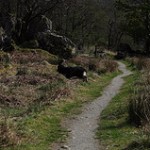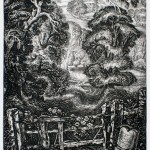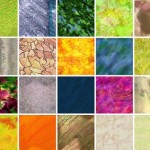First off, let me beg you to buy some poetry. Don’t just download it, please. Poets have to eat, too.
Change from schoolmistressy voice to reflective.
Here are some poems you might like to try or revisit – the first few that sprang to mind which have a vague connection to the theme of home – and one of mine.
Might I suggest a little Gerard Manley Hopkins – “Inversnaid “? 
The heartfelt entreaty of “What would the world be, once bereft/Of wet and of wilderness?” speaks to me of the moorland that I love in my Yorkshire homeland. I studied GMH out of sheer perversity ( ‘The Wreck of the Deutschland’ with Miss Grey at Wakefield Girls’ High School) – and grew to love him. The intensity of his feelings, the texture of his words, almost crunchy in their concentration, and the sheer weird beauty of sprung rhythm.
Secondly, John Donne: “The Sunne Rising”. Another passionate priest. Hear the power of romantic love contemptuous of anything that distracts “Nor houres, dayes, months, which are the rags of time.” I like my Donne unfiltered, I hear him better through the original spelling: “saucy pedantique wretch”. Is there any better distillation of ‘home’ than being in bed with the one you love?
I have no qualms about reproducing this one on the same theme – I think the copyright’s well and truly gone!
O Western Wind
Anon, 14th century
O Western wind, when wilt thou blow
That the small rain down can rain?
Christ, if my love were in my arms
And I in my bed again.
Anon is a favourite poet – I cannot resist the bleakness of “The Lyke Wake Dirge” for one ( another bit of grim Northernness) – “Fire and fleet and candleleet and Christ receive thy soul” .
Being inside in foul weather seems to be a theme: I love “Wind” by Ted Hughes. Who can beat the directness of “This house has been far out at sea all night” ? It’s the vigour of his work that gets me. “The Remains of Elmet” with the haunting photographs by Fay Godwin is a much-loved book.
You will probably have guessed by now I like unsentimental nature poetry so George Mackay Brown, RS Thomas, John Clare and DH Lawrence get an honourable mention but Edward Thomas never fails to move me. His works are as delicate and deep as the etchings of Robin Tanner. I immediately thought of “Tall Nettles” – Asquith’s farm behind my home in Wakefield had a machinery graveyard I loved.

And to end with – a poem that I wrote which was published in the same anthology as two by Simon Armitage, no less. Only because we both had a Huddersfield connection at the time, I have to confess. Author’s Note: Ellis Laithe is a place, not a person (laithe is a Viking word for a barn, and shippon is dialect for a cow house).
To Ellis Laithe – a Conversation
Which way did you go?
Through a green gate sagging between stone pillars
Like a drunk between his silent friends.
What was in the garden?
Stacked slates drowning under nettle spires,
Snow-and-sulphur tongued flags just linger,
Like the crusted pear.
Some outbuildings;
Open mouthed coalscuttles,
Gagged with rosebay willow herb.
Anything new?
Only soaring thistles prickling the mothy air,
And the gaudy burnet clustered on them.
Some catpiss elders teem,
And flittering tortoiseshells snap shut,
On the hugely domed Fool’s Parsley.
Did you hear anything?
Only the arguing spugs’ echo in the dustrailed shippon,
And grit swilling down the gutter stone.
Who is in the house now?
A grasping bramble had crossed the doorstep, no more.
Did you see aught of mine?
In the kitchen, spiderstring nets cross the windowlight,
Falling through a stalactite-papered ceiling,
And in a mote-speckled spotlight lies
One single laceless crumpled boot;
A bleary sheen of mildew on the toe,
And the dark slit of a peeling heel
Distinguish it.
Goodbye old friend,
I’ll not visit there again,
Except in memory.
It would be best.
Rosemary Tate … from ‘An Anthology of Local Poetry’, Huddersfield Polytechnic 1985





















